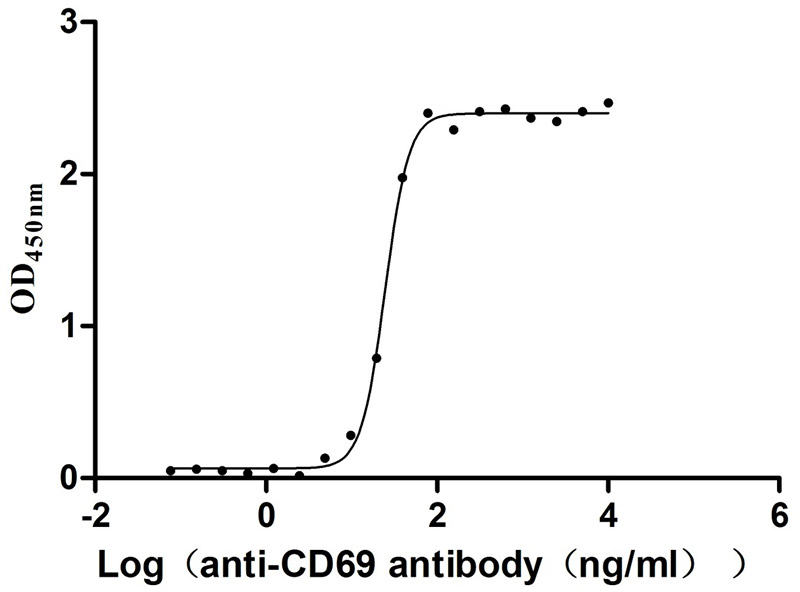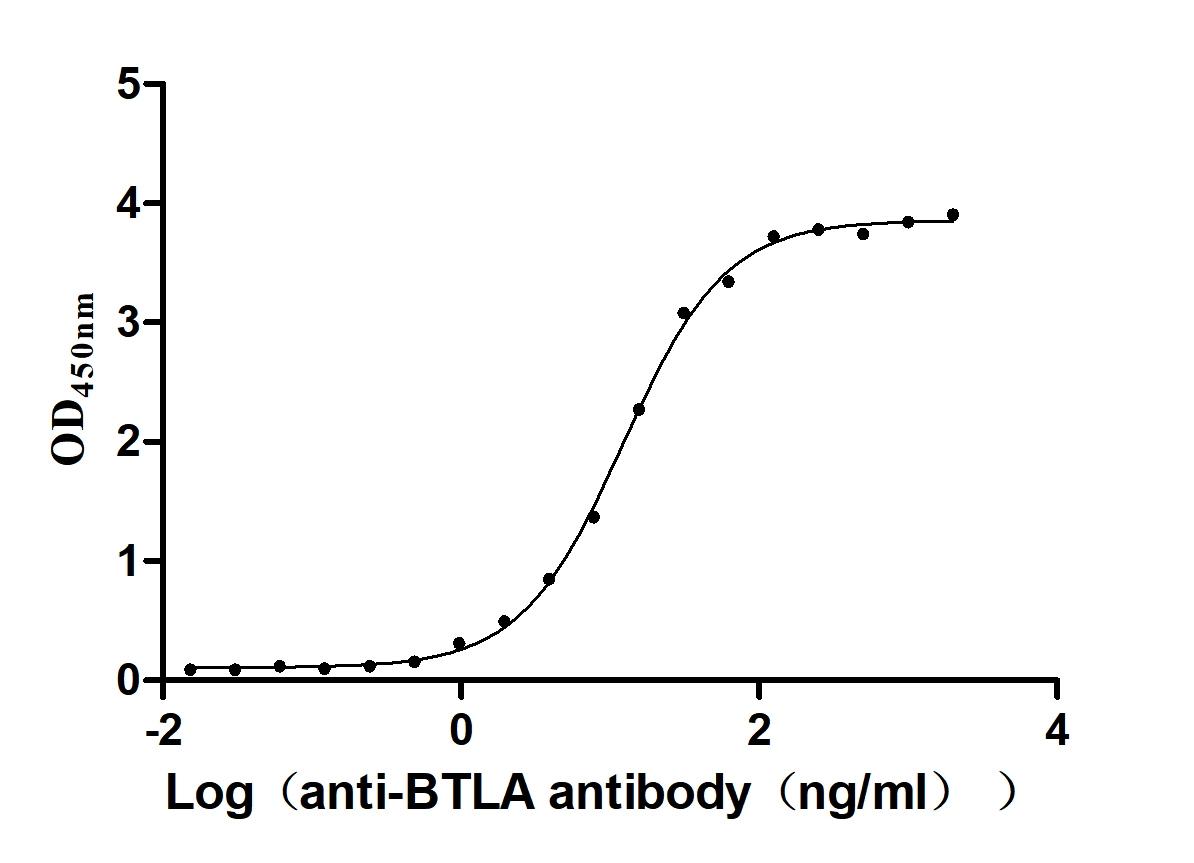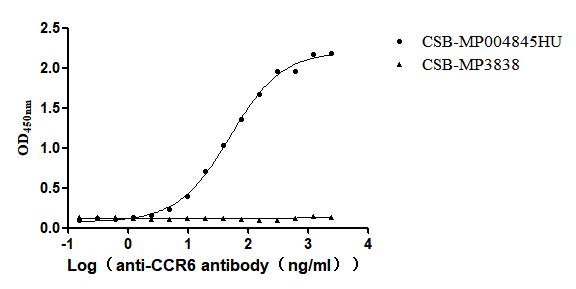Recombinant Mouse Hepatocyte nuclear factor 1-alpha (Hnf1a)
-
货号:CSB-YP010592MO
-
规格:
-
来源:Yeast
-
其他:
-
货号:CSB-EP010592MO
-
规格:
-
来源:E.coli
-
其他:
-
货号:CSB-EP010592MO-B
-
规格:
-
来源:E.coli
-
共轭:Avi-tag Biotinylated
E. coli biotin ligase (BirA) is highly specific in covalently attaching biotin to the 15 amino acid AviTag peptide. This recombinant protein was biotinylated in vivo by AviTag-BirA technology, which method is BriA catalyzes amide linkage between the biotin and the specific lysine of the AviTag.
-
其他:
-
货号:CSB-BP010592MO
-
规格:
-
来源:Baculovirus
-
其他:
-
货号:CSB-MP010592MO
-
规格:
-
来源:Mammalian cell
-
其他:
产品详情
-
纯度:>85% (SDS-PAGE)
-
基因名:
-
Uniprot No.:
-
别名:Hnf1a; Hnf-1; Hnf-1a; Tcf1Hepatocyte nuclear factor 1-alpha; HNF-1-alpha; HNF-1A; Liver-specific transcription factor LF-B1; LFB1; Transcription factor 1; TCF-1
-
种属:Mus musculus (Mouse)
-
蛋白长度:Full length protein
-
表达区域:1-628
-
氨基酸序列MVSKLSQLQT ELLAALLESG LSKEALIQAL GEPGPYLMVG EGPLDKGESC GGSRGDLTEL PNGLGETRGS EDDTDDDGED FAPPILKELE NLSPEEAAHQ KAVVESLLQE DPWRVAKMVK SYLQQHNIPQ REVVDTTGLN QSHLSQHLNK GTPMKTQKRA ALYTWYVRKQ REVAQQFTHA GQGGLIEEPT GDELPTKKGR RNRFKWGPAS QQILFQAYER QKNPSKEERE TLVEECNRAE CIQRGVSPSQ AQGLGSNLVT EVRVYNWFAN RRKEEAFRHK LAMDTYNGPP PGPGPGPALP AHSSPGLPTT TLSPSKVHGV RYGQSATSEA AEVPSSSGGP LVTVSAALHQ VSPTGLEPSS LLSTEAKLVS ATGGPLPPVS TLTALHSLEQ TSPGLNQQPQ NLIMASLPGV MTIGPGEPAS LGPTFTNTGA STLVIGLAST QAQSVPVINS MGSSLTTLQP VQFSQPLHPS YQQPLMPPVQ SHVAQSPFMA TMAQLQSPHA LYSHKPEVAQ YTHTSLLPQT MLITDTNLST LASLTPTKQV FTSDTEASSE PGLHEPPSPA TTIHIPSQDP SNIQHLQPAH RLSTSPTVSS SSLVLYQSSD SNGHSHLLPS NHSVIETFIS TQMASSSQ
-
蛋白标签:Tag type will be determined during the manufacturing process.
The tag type will be determined during production process. If you have specified tag type, please tell us and we will develop the specified tag preferentially. -
产品提供形式:Lyophilized powder
Note: We will preferentially ship the format that we have in stock, however, if you have any special requirement for the format, please remark your requirement when placing the order, we will prepare according to your demand. -
复溶:We recommend that this vial be briefly centrifuged prior to opening to bring the contents to the bottom. Please reconstitute protein in deionized sterile water to a concentration of 0.1-1.0 mg/mL.We recommend to add 5-50% of glycerol (final concentration) and aliquot for long-term storage at -20℃/-80℃. Our default final concentration of glycerol is 50%. Customers could use it as reference.
-
储存条件:Store at -20°C/-80°C upon receipt, aliquoting is necessary for mutiple use. Avoid repeated freeze-thaw cycles.
-
保质期:The shelf life is related to many factors, storage state, buffer ingredients, storage temperature and the stability of the protein itself.
Generally, the shelf life of liquid form is 6 months at -20°C/-80°C. The shelf life of lyophilized form is 12 months at -20°C/-80°C. -
货期:Delivery time may differ from different purchasing way or location, please kindly consult your local distributors for specific delivery time.Note: All of our proteins are default shipped with normal blue ice packs, if you request to ship with dry ice, please communicate with us in advance and extra fees will be charged.
-
注意事项:Repeated freezing and thawing is not recommended. Store working aliquots at 4°C for up to one week.
-
Datasheet :Please contact us to get it.
靶点详情
-
功能:Transcriptional activator that regulates the tissue specific expression of multiple genes, especially in pancreatic islet cells and in liver. Binds to the inverted palindrome 5'-GTTAATNATTAAC-3'. Activates the transcription of CYP1A2, CYP2E1 and CYP3A11.
-
基因功能参考文献:
- TCF-1 controls T cell fate is through its widespread ability to target silent chromatin and establish the epigenetic identity of T cells. PMID: 29466756
- Tcf1 binding reduced the activity of a Gzmb-associated regulatory element, and this accounted for the reduced Gzmb expression in Tcf1-expressing NK cells. PMID: 28723565
- Transcriptional analysis revealed 4 important genes involved in sphingolipid metabolism to be deregulated in HNF1A deficiency: Ormdl1, sphingosine kinase-2, neutral ceramidase, and ceramide synthase-5. PMID: 29109103
- This is attributed in part to ineffective repression of Tcf1 expression in knockout T cells, as DNMT3a localizes to the Tcf7 promoter and catalyzes its de novo methylation in early effector WT CD8(+) T cells. These data identify DNMT3a as a crucial regulator of CD8(+) early effector cell differentiation and effector versus memory fate decisions. PMID: 27582468
- We identified PD-1 to be specifically expressed in PLZF(+) ILCp and revealed that the timing and order of expression of the transcription factors NFIL3, ID2, and TCF-1 was critical. Importantly, induction of ILC lineage commitment required only transient expression of NFIL3 prior to ID2 and TCF-1 expression. PMID: 27705792
- Knockdown of MACF1 in osteoblastic cells inhibits osteoblast differentiation through suppressing the beta-catenin/TCF1-Runx2 axis. PMID: 28621459
- Lef1 and Tcf1 showed oncogenic effect in colonic carcinogenesis. Cellular context of miRNAs might play important roles in carcinogenesis by altering the expression pattern of Lef/Tcfs members. PMID: 27433921
- this study found that virus-specific CD8(+) T cells that sustained the T cell response during chronic viral infection are defined by, and depended on, the expression of Tcf1 PMID: 27533016
- data demonstrate a novel miR-24-TCF1 pathway in controlling effector cytokine production by T cells and further suggest miR-24 could function as a key upstream molecule regulating TCF1-mediated immune responses. PMID: 28404635
- HNF1alpha plays a crucial role in hepatocyte lipid metabolism and hepatocarcinogenesis PMID: 28547778
- Data show that TCF1 proteindeficiency relieved most manifestations of autoimmune lymphoproliferative syndrome (ALPS)-like phenotype, which were caused by Fas protein mutation in TCF1(-/-) lpr/lpr mice. PMID: 28349581
- Data show that the Wnt-effector hepatocyte nuclear factor 1-alpha (Tcf1) is recruited to and triggers transcription of the Ink4/Arf tumor suppressor locus, such as as p15Ink4b, p16Ink4a and p19Arf. PMID: 28346462
- this study shows that distinct, asynchronous and stage-specific transcription factors (TCF-1, GATA-3 and Runx1) activate Bcl11b for T cell commitment PMID: 27376470
- this study shows that the transcription factors Tcf1 and Lef1 suppress CD4+ T lineage genes in CD8+ T cells through intrinsic histone deacetylase activity PMID: 27111144
- Results show that Tcf1 binding to Zfp703 inhibits beta-catenin/Tcf1 complex formation. PMID: 27090637
- this study shows that Tcf1 short isoforms are adequate in supporting developing thymocytes to traverse through maturation steps and in regulating the expression of most Tcf1 target genes PMID: 28348272
- HNF1alpha plays a key role in the constitutive expression of megalin and cubilin, hence regulating endocytosis in the proximal tubule of the kidney. PMID: 27083284
- leukemic stem cells are therefore more sensitive to loss of Tcf1 and Lef1 than Hematopoietic Stem Cells in their self-renewal capacity. PMID: 27044748
- Sp5/8 bind directly to GC boxes in Wnt target gene enhancers and to adjacent, or distally positioned, chromatin-bound T-cell factor (Tcf) 1/lymphoid enhancer factor (Lef) 1 to facilitate recruitment of beta-catenin to target gene enhancers. PMID: 26969725
- TCF1 is required for the T follicular helper cell response to viral infection functioning through negative feedback loops with IL-2 and Blimp1. PMID: 26365183
- Our data demonstrate that HNF1A is an important cell-intrinsic transcription factor in adult B lymphopoiesis PMID: 26800876
- This paper demonstrates a cell-intrinsic requirement for transcription factors TCF1 and LEF1 for the development of all subsets of Natural Killer T cells. PMID: 26490636
- Beta-catenin's function in regulating mouse embryonic stem cells is highly context specific and its interaction with TCF1 promotes differentiation. PMID: 26459597
- HNF1alpha, but not HNF1beta, is the primary positive regulator of PCSK9 transcription in mouse liver PMID: 25652089
- IP3R-mediated Ca2+ signaling reinforces Tcf-1 activity to both ensure normal development and to prevent thymocyte neoplasia. PMID: 25215520
- critical for suppression of CD8-positive T-cell function PMID: 25355919
- TCF-1 physically interacted with Runx3 to cooperatively silence Cd4. PMID: 24836425
- Deletion of intestinal SIRT1 impairs DCoH2-HNF-1alpha-FXR signaling and alters systemic bile acid homeostasis. PMID: 24389307
- the data strongly supports a critical role for HNF4a and Hnf1a in the tissue-specific regulation of drug handling and differentiation toward a PT-like cellular identity. PMID: 24038112
- Loss of TCF-1 expression impaired the capacity of these innate lymphoid cell subsets to produce IL-5, IL-13, and IL-22 and resulted in crippled responses to intestinal infection with Citrobacter rodentium. PMID: 24038093
- Lack of Tcf1 induces thymic lymphomas with high frequency. PMID: 23185135
- Among all Muc5ac regulators, only GATA-6 and HNF-4a expression was concomitant to that of Muc5ac in the developing stomach. PMID: 22554936
- HNF1alpha might regulate beta-cell mass or function at least partly by modulating Hgfac expression. PMID: 22877752
- Dynamic changes in gene expression occur on pancreatitis induction, determining altered exocrine and endocrine function. This analysis uncovers roles for Hnf1alpha in the regulation of acinar cell determination and function. PMID: 21948943
- The miR-192/-194 cluster was markedly down-regulated in liver of Tcf1(-/-) mice. PMID: 21887698
- Hepatic nuclear factor 1alpha (HNF1alpha) dysfunction down-regulates X-box-binding protein 1 (XBP1) and sensitizes beta-cells to endoplasmic reticulum stress. PMID: 21784843
- Cell cycle-related kinase is a direct androgen receptor-regulated gene that drives beta-catenin/T cell factor-dependent hepatocarcinogenesis PMID: 21747169
- a critical link between HNF1A-MODY-induced alterations in Bmp-3 expression and insulin gene levels PMID: 21628466
- Report the opposing effects of Tcf3 and Tcf1 control Wnt3a stimulation of embryonic stem cell self-renewal. PMID: 21685894
- data suggest a model where Notch signals induce TCF-1, and TCF-1 in turn imprints the T-cell fate by upregulating expression of T-cell essential genes PMID: 21814277
- Hnf1-alpha regulates MafA in beta-cells and compromised MafA expression contributes to beta-cell dysfunction in maturity onset diabetes of young mice. PMID: 21193557
- These findings reveal a novel nutrient-dependent interaction between Sirt1 and HNF-1alpha which results in regulation of Crp expression. PMID: 21176092
- Data indicate that HNF1alpha is a more potent activator of AFM promoter than is HNF1beta. PMID: 20979532
- Although the phenotype of the Hnf1a-null mouse is complex, metabolomics has opened the door to investigation of several physiological systems in which Hnf1alpha may be a critical regulatory component. PMID: 20943816
- HNF1alpha directly regulates the expression of ClC-5 in the renal proximal tubule PMID: 20810608
- beta-catenin, Lef1 & Tcf1 are needed for Bmp4 expression maintaining Shh expression in the dental ectoderm. The number of incisors from one placode can be varied through local changes of a mesenchymal signaling circuit involving these proteins. PMID: 20883686
- central role of DNA methylation in the kidney-specific expression of amino acid transporters thus determining both the tissue distribution of their master regulator, Hnf1alpha, and its interaction with downstream PMID: 20555317
- a functional role for Hnf1alpha in regulating adult intestinal growth and sustaining the functions of intestinal epithelial cell lineages PMID: 20808783
- findings provide an in vivo strategy to study combinatorial gene regulation and reveal how Hnf1alpha and Hnf4alpha control a common islet-cell regulatory program that is defective in human monogenic diabetes PMID: 20523905
- Study identifies new direct target genes of the Hnf1a transcription factors and shows that they play crucial roles in both defining cell fate and controlling terminal functions in the gut epithelium. PMID: 20388655
显示更多
收起更多
-
亚细胞定位:Nucleus.
-
蛋白家族:HNF1 homeobox family
-
组织特异性:Liver.
-
数据库链接:
KEGG: mmu:21405
STRING: 10090.ENSMUSP00000031535
UniGene: Mm.332607
Most popular with customers
-
Recombinant Human Tyrosine-protein kinase Mer (MERTK), partial (Active)
Express system: Mammalian cell
Species: Homo sapiens (Human)
-
Recombinant Mouse GDNF family receptor alpha-like (Gfral), partial (Active)
Express system: Mammalian cell
Species: Mus musculus (Mouse)
-
Recombinant Human Claudin-18.2 (CLDN18.2)-VLPs (Active)
Express system: Mammalian cell
Species: Homo sapiens (Human)
-
Recombinant Mouse Tyrosine-protein kinase Mer (Mertk), partial (Active)
Express system: Mammalian cell
Species: Mus musculus (Mouse)
-
Recombinant Human Early activation antigen CD69 (CD69), partial (Active)
Express system: Mammalian cell
Species: Homo sapiens (Human)
-
Recombinant Human Myosin regulatory light chain 12A (MYL12A) (Active)
Express system: E.coli
Species: Homo sapiens (Human)
-
Recombinant Human B- and T-lymphocyte attenuator(BTLA), partial (Active)
Express system: Mammalian cell
Species: Homo sapiens (Human)
-
Recombinant Human C-C chemokine receptor type 6(CCR6)-VLPs (Active)
Express system: Mammalian cell
Species: Homo sapiens (Human)


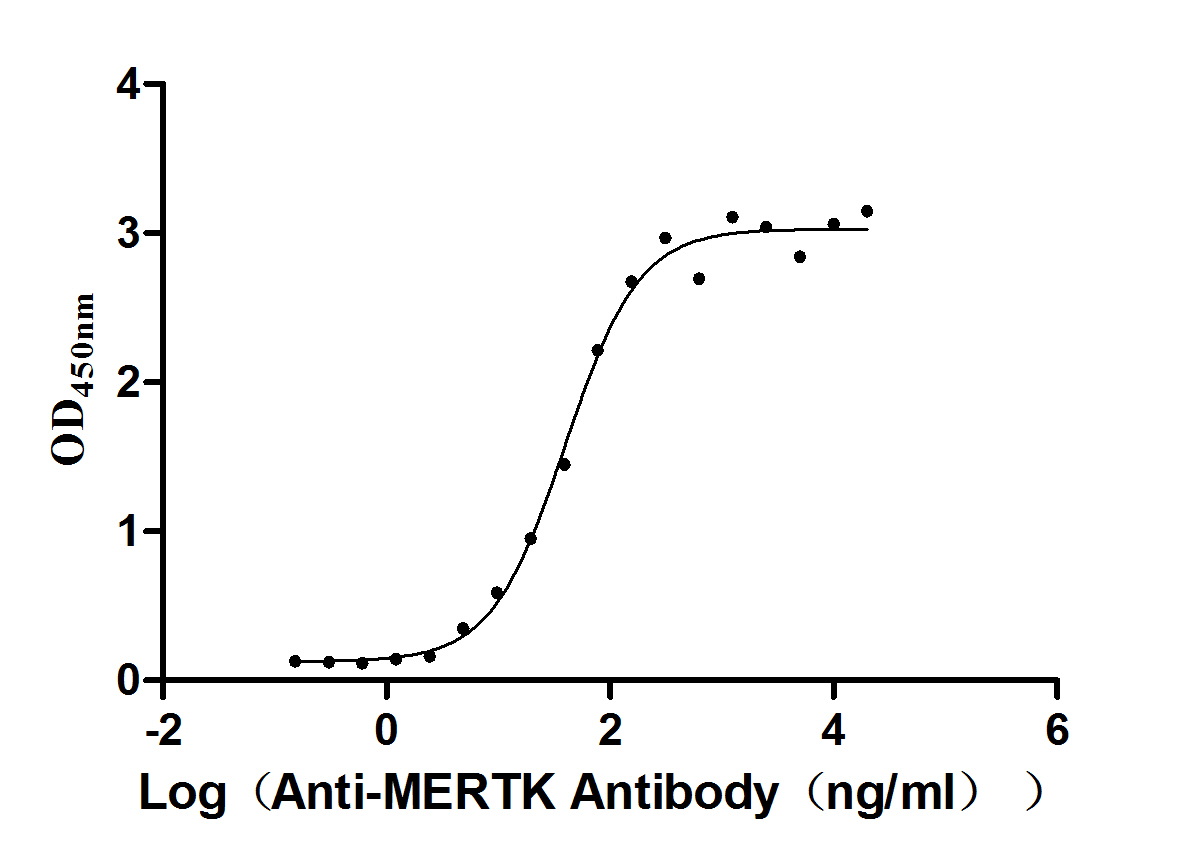
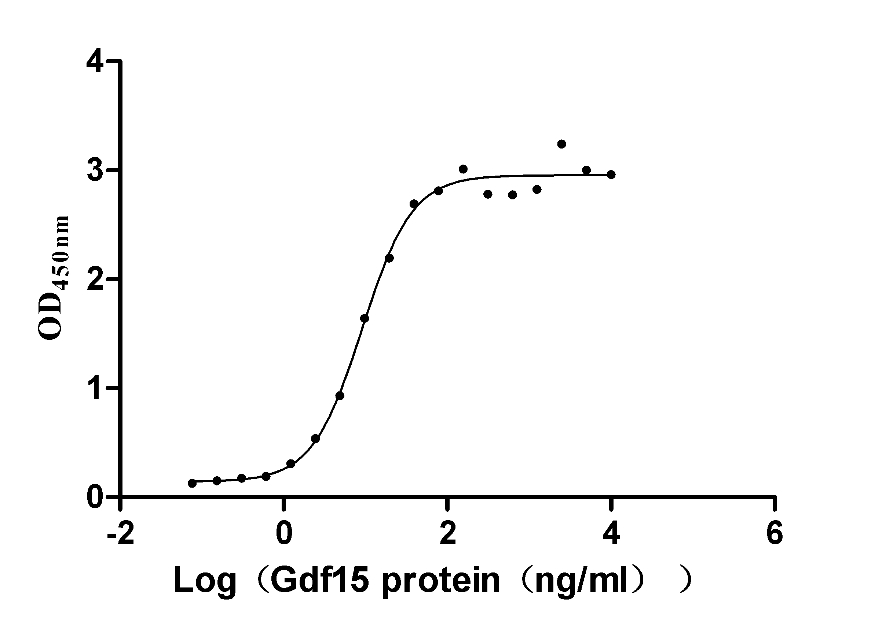
-AC1.jpg)

